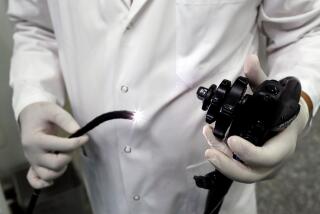Colorectal Cancer Is Focus of Long Overdue Attention
- Share via
A couple of influential young widows, a major-league baseball star and some political know-how have converged to raise Americans’ awareness of one of the deadliest forms of cancer--colorectal cancer.
With a blitz of advertising and public service announcements peaking this month, Americans will be reminded that simple screening tests could save thousands of lives.
The charge is being led by “Today” show co-host Katie Couric, who lost her 42-year-old husband in 1998 to colon cancer, a disease that killed 56,000 Americans last year.
And while Couric may be the most visible, she is not alone at the forefront of the campaign to reduce deaths from colon cancer. Several advocacy organizations that have long fought for increased research spending and greater awareness of colon cancer have finally succeeded in bringing the deadly disease before the American public and Congress.
Anyone who listens to these advocates should be disturbed by what they learn. For example:
* While colorectal cancer screenings are recommended for everyone 50 and older, as well as high-risk people younger than 50, only about 20% of people in those groups get the exam.
* While Medicare covers most colorectal screening techniques, many private health insurers will not pay for more expensive tests, such as sigmoidoscopy or colonoscopy, unless there are symptoms or a strong family history.
* Even though the disease is a major killer, government spending for colorectal cancer research lags comparable spending for other diseases. For every death from colorectal cancer, the government spends about $2,341 on prevention; the comparable figure for breast cancer research is $12,610 per death, according to Colon Cancer Alliance, an advocacy group. (Colorectal cancer includes cancers of the colon, rectum, appendix and anus.)
Advocacy groups fighting breast and lung cancer, among others, have for years been successful at focusing public attention on those diseases. But advocates for colorectal cancer awareness won their first big battle only in November, when Congress designated this month Colorectal Cancer Awareness Month.
Until now, “colon cancer is something that people just haven’t talked about,” says Dr. H. Randolph Bailey, president of the American Society of Colon and Rectal Surgeons and chief of colon and rectal surgery at the University of Texas Medical School in Houston.
The disease attracted brief national attention in 1985, when President Ronald Reagan underwent surgery for a cancerous polyp.
Advocates believe the current consciousness-raising for colorectal cancer may be a sustained effort because of the multitude of people and projects devoted to the issue. Couric has been joined by cancer fund-raiser Lilly Tartikoff, whose husband, Brandon, a former television executive and Paramount Pictures chief, died of Hodgkin’s disease, a form of cancer, in 1997, and the Entertainment Industry Foundation, a Los Angeles-based fund-raising group.
Tartikoff and Couric co-founded the National Colorectal Cancer Research Alliance and recruited, among others, St. Louis Cardinals star Eric Davis, who was diagnosed with colon cancer in 1997, and the family of cartoonist Charles M. Schulz, the “Peanuts” creator who recently died after being diagnosed with colon cancer last year.
The alliance “has been a real success story in just a short period of time,” says Dr. Dennis Slamon, a noted cancer researcher at UCLA who is also an advisor to the alliance. “People with that level of celebrity make awareness of the disease so much more obvious. But it’s still not enough. This disease has to be brought before the public and kept there to make a real difference.”
*
To be sure, it will take a long and sustained effort to convince Americans to take colorectal cancer prevention as seriously as they do mammograms, Papsmears or prostate cancer screenings.
Colorectal cancer is diagnosed in about 130,000 Americans each year, and is the second-leading cause of death from cancer, after lung cancer. When the disease is detected early--usually when there are no symptoms--the chances for a cure are excellent. Only about 37% of all cases, however, are detected at that manageable, early stage.
“Colon cancer is probably 100% curable through prevention and early screening,” says Dr. Donald R. Henderson, a Los Angeles gastroenterologist who works with the American Cancer Society. “No one should die from this disease.”
Studies have shown numerous strategies to help prevent colorectal cancer include: exercising; avoiding smoking and excess alcohol use; and consuming a diet low in fat and high in fiber, fruits and vegetables.
Colon cancer often starts as a small polyp growing inside the colon or rectum. Not all polyps become cancerous, but they should still be removed because of that possibility.
Colorectal cancer can be detected through a home test called the fecal occult blood test, in which a stool sample is checked for the presence of blood traces. Other screening methods include the sigmoidoscopy, which examines the lower third of the colon, and colonoscopy, which examines the entire colon.
Some polyps can also be detected by a digital rectal exam. A final test is a double-contrast barium enema that provides an X-ray of the colon.
According to a study published this month in the journal Diseases of the Colon and Rectum, a computerized tomography, or CAT, scan may become available within the next decade to examine the colon without inserting a tube.
*
But for now, Americans have to come to grips with the idea of colon and rectal exams. And, so far, we haven’t.
“The screening is not high-tech and is rather invasive,” says Henderson. He attributes the relatively low screening rates to doctors’ lack of awareness and increased “time pressures,” a result of seeing a lot of HMO patients.
For example, even though Medicare pays for screening, only 14% of people 65 or older get one of the four screening tests, according to government testimony presented last week in Washington, D.C.
While most HMOs and other health insurers will cover the inexpensive fecal occult blood test and, sometimes, sigmoidoscopy, doctors usually need to offer some reason why colonoscopy or a barium-enema X-ray is needed. However, most major health groups, including the American Cancer Society, recommend that people older than 50 have a routine colonoscopy every 10 years.
“Many of the private insurance companies will only pay for these if there are specific indications,” says Bailey. “But once you have symptoms, it’s no longer screening. If you have to wait until you’re 65 and on Medicare to have a colonoscopy, that’s a lot of lost time.”
A bill pending in Congress, backed by Sen. Edward M. Kennedy (D-Mass.), would require health insurers to pay for any colorectal screening test recommended by a doctor.
And legislation is seen as only a first step. Groups such as the American Cancer Society and the Colon Cancer Alliance, a New York-based group of survivors and caregivers, are also lobbying to increase the government budget for colorectal cancer prevention from $3 million in 2000 to $25 million next year. The U.S. Centers for Disease Control and Prevention’s budget for breast and cervical cancer prevention was $158 million last year, according to the Colon Cancer Alliance.
“You need the survivors, the widows, the people who have lost their parents, to go to Congress,” says Nancy Roach, director of advocacy of the Colon Cancer Alliance. “It’s that grass-roots advocacy effort that can really change the way a disease is treated. When people become comfortable talking about colorectal cancer, that’s when we’ll see a change.”
Couric has proved that she is plenty comfortable talking about her experience with the disease. So is Debbie Benedict, a 46-year-old Los Angeles woman who was diagnosed with colon cancer in 1998.
“I just want to get the word out to everyone,” Benedict says. “I go around giving my friends tips for undergoing a colonoscopy. If we all do that one test on one day of your life, it may keep you from having something horrible happen to you.”
(BEGIN TEXT OF INFOBOX / INFOGRAPHIC)
Who Should Get Screened for Colorectal Cancer?
All men and women age 50 and older.
* Before age 50, anyone with a personal or family history of colorectal cancer or polyps, or a personal history of inflammatory bowel disease.
* Before age 50, women with a personal or family history of ovarian, endometrial or breast cancer.
(BEGIN TEXT OF INFOBOX / INFOGRAPHIC)
Risks and Screenings
The chances of surviving colon cancer rise dramatically if the malignancy is detected early.
Stage of disease: Local (confined to the colon)
5-year survival rate: 90%
*
Stage of disease: Regional (spread to surrounding tissue/organs)
5-year survival rate: 65%
*
Stage of disease: Distant (spread to remote areas)
5-year survival rate: 8%
*
Source: American Cancer Society Cancer Facts & Figures 2000
(BEGIN TEXT OF INFOBOX / INFOGRAPHIC)
Types of Screening Tests
The frequency of screening may vary according to a person’s medical history.
* Fecal occult blood test. A simple chemical test to check stool sample for hidden blood. Should be done every year.
* Flexible sigmoidoscopy. A visual exam of the rectum and lower part of the colon done in doctor’s office. Recommended every five years.
* Double-contrast barium enema. An X-ray of the entire colon performed in a hospital or clinic. Recommended every five to 10 years.
* Colonoscopy. A visual exam of the entire colon performed in hospital or clinic. Recommended every five or 10 years.
* Digital rectal exam. Doctor exam of rectum. Recommended every five to 10 years.
Source: American Society of Colon and Rectal Surgeons






